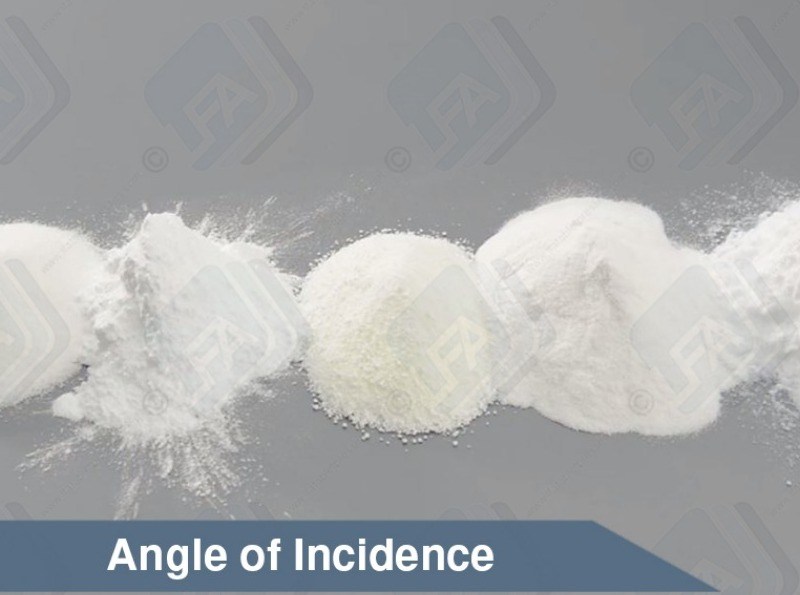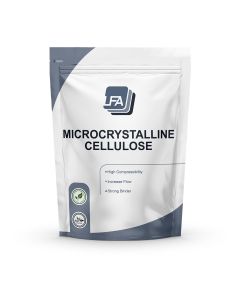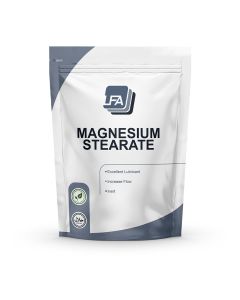L'idrogenofosfato di calcio è un ingrediente utilizzato in diversi prodotti. Viene utilizzato nella fabbricazione delle compresse e delle capsule come "agente fluente". L'idrogenofosfato di calcio è disponibile in diverse dimensioni delle maglie. La grana più grossa qui fornita scorre meglio e ha un grado di compressibilità eccellente.
La fluidità è un elemento fondamentale del processo di fabbricazione. Essa garantisce che i vostri ingredienti fluiscano con facilità attraverso i macchinari. Inoltre, il prodotto finale avrà ingredienti coerenti. Questo assicura che ogni compressa sarà sempre uguale.
La compressibilità è la facilità con cui la polvere si forma in una compressa solida. L'idrogenofosfato di calcio di LFA è comprimibile direttamente. Utilizzando eccipienti come l'idrogenofosfato di calcio si riduce lo sforzo necessario per la creazione di nuove formule.
L'idrogenofosfato di calcio è altamente solubile nell'acido citrico e nel citrato di ammonio. Possiede un pH di 6.5 fino a 7. A causa della sua alcalinità, non funziona con alcuni ingredienti attivi acidi. L'idrogenofosfato di calcio ha moderate proprietà leganti. Deve essere utilizzato con altri eccipienti.
L'idrogenofosfato di calcio attraversa facilmente il sistema digestivo. E' adatto a molti usi differenti, ed è un integratore alimentare nel suo stato normale. Spesso viene incluso nei cereali, nella farina e nei noodle. Viene utilizzato come agente anti-agglomerante in quanto può assorbire piccole quantità di umidità. E' anche un minerale con una buona dose di fosforo, che spesso viene utilizzato nelle diete organiche. Un altro utilizzo dell'idrogenofosfato di calcio è quello di mangime per gli animali. Favorisce il metabolismo animale, accelerandone la crescita e lo sviluppo.
E' importante maneggiare con cura l'idrogenofosfato di calcio, sia per sicurezza e sia per mantenere intatta la qualità del prodotto. Questo prodotto può irritare gli occhi e l'inalazione può causare fastidio al torace. Quando viene maneggiato, bisogna farlo utilizzano occhiali protettivi, guanti e una maschera di inalazione. Conservare sempre l'idrogenofosfato di calcio in un contenitore sigillato, a temperatura moderata. Evitare l'esposizione in luoghi umidi e con elevate temperature. Una conservazione non corretta può modificare la durezza della compressa nel tempo.
L'idrogenofosfato di calcio è un efficace agente fluidificante, che migliora l'efficacia dei nutrienti della vostra formula. Può essere aggiunto a molti alimenti come integratore per contribuire al benessere umano e animale. Apportare fosforo e calcio nel corpo del consumatore, migliore le funzioni in molti modi. Questo è un prodotto con cui i consumatori hanno familiarità ed è l'aggiunta perfetta per le vostre compresse.
L'idrogenofosfato di calcio di LFA arriva sotto forma di polvere cristallina. Può essere bianca o bianco sporco, inodore e fluisce liberamente.
Are all excipients safe for all ages to consume?
Yes, it does not matter what age, size or sex the person consuming the products is. It is, however, important to check the intolerance data.
Are all the excipients safe for human consumption?
Yes, all of the excipients are safe for human or animal consumption. There are some precautions that should be taken when handling them and there are some people that might have intolerances to some of them. Information on this can be found in the products MSDS and Intolerance Data Sheet. This can be found in this section for every excipient.
Are there any known allergens or health risks?
Sono il tuo Eccipienti naturali?
Sì, tutti i nostri Eccipienti sono estratti da fonti naturali. Per ulteriori informazioni, si prega di visitare la pagina di ciascun prodotto.
Can I get a better price for excipients than is listed on the website?
Yes, we have bulk pricing for all of our excipients, and these can be found in this section. We offer bulk in 500 kg, 1 ton, 2 ton and 5 ton lots. The prices are set on these quantities as these are the amounts that will fit on pallets.
Can I have a CoA for my Excipient?
Yes. CoA stands for Certificate of Analysis this is also known some times as an MSDS (Material Safety Data Sheet) all of the information contained in a CoA is inside the MSDS for every LFA product which is emailed to you after purchase.
Posso produrre compresse senza Eccipienti?
È improbabile che si sarà in grado di produrre tablet senza l'utilizzo di uno qualsiasi degli Eccipienti. Alcuni prodotti si legano senza Eccipienti, ma poi non passano attraverso la macchina. Si consiglia di utilizzare un
Dissolving rate? Any known factors that can affect the rate, speed up or slow down the breakdown of a tablet?
Yes. There are two things at play here. You can get hygroscopic and hydrophobic excipients. Hygroscopic means that they take on water quickly, while hydrophobic means that they repel water.
There are products know as supper disintegrants. These products help the breakdown of tablets. At the moment LFA does not sell any supper disintegrants.
Magnesium stearate is hydrophobic this means that it will slow the breakdown of a tablet.
However, it is used in such small amounts that most of the time it will not make a difference to our customer's products. If they would like to be sure then they should conduct what is known as a disintegration test.
Do any of the excipients increase the speed of damage to tooling? i.e. more granular?
Yes, Dicalcium Phosphate, if used in high amounts, will cause more damage to tooling than just Firmapress or MCC. However, there are not many situations in which this would be a good idea.
How long is the storage period of each excipient? What is the shelf life?
Firmapress - 2 years form batch date.
Dextrose - 3 years from batch date.
Dicalcium Phosphate - 3 years from batch date.
Microcrystalline Cellulose -
Magnesium stearate -
Lactose - 2 years from batch date.
Silica Dioxide - 2 years from batch date.
How should I clean contact parts that have come into contact with my excipients or active ingredients?
here are 6 steps that should be followed as a general rule of thumb when cleaning contact surfaces that have come into contact with powders:
Dry Clean - First you need to remove as much of the dry powder as possible. You can do this using a hover/vacuum. Make sure that the vacuum you are using has a filter good enough to handle fine dust.
Wet Clean - Next you need to perform a wet clean. This can be done with warm water and soap or if available an ultrasonic cleaner.
Rinse - Next you need to rinse off any soap with potable water (drinking water). You do not have to do this if you used an ultrasonic cleaner in the last step. It is important to ensure that all parts are thoroughly dried immediately after washing to avoid any rusting.
Sanitise - Next you need to sanitise the surface. This step is recommended by the FDA. There are a number of sanitising solutions available designed to be applied and left on.
Lubricate - You now need to lubricate any parts that require it. This should be with the appropriate grade oil or grease considering your use and greasing chart. Store - Finally store any of the parts in a cool dry place. If you are storing them on the machine then make sure the machine is in a temperature controlled environment with low humidity.
Qual è la differenza tra la gamma di eccipienti?
Offriamo Cellulosa Microcristallina, Stearato di Magnesio, Fosfato Dicalcico e Firmapress nella nostra gamma di eccipienti.
Cellulosa microcristallina, un legante, che detiene il contenuto del tablet insieme.
Il Fosfato dicalcico è un fluire di agente e aiuta a spostare ingredienti attraverso la macchina prima sono compressi.
Stearato di magnesio è un lubrificante secco e aiuta di nuovo con il movimento degli ingredienti attraverso la macchina, ma aiuta anche con l'espulsione di compresse dalla macchina. Siete pregati di notare che il Magnesio Stearato non associa se stesso.
Firmapress è un tutto in un mix di Cellulosa Microcristallina, Stearato di Magnesio e Fosfato di calcio.
What is the mesh size of your excipients? etc.
Dextrose - approx 100 mesh
Dicalcium Phosphate - approx 100 mesh
Microcrystoline Cellulose - approx 120-200
Magnesium sterate -
Lactose - 80 mesh
Silica Dioxide -
Firmapress - 100-200 mesh
What kind of agent is each excipient?/ What is the main use of each excipient?
Dextrose - Sweetener, binding agent, good for chewable tablets or candy.
Microcrystalline Cellulose - Binder, filling agent. Good at binding tablets and making them bigger. It can also be used as a filler for capsules.
Magnesium stearate - Dry Lubricant. This stops products from getting stuck to the tooling. It can also help with powder flow issues and caking issues.
Lactose - Binder, sweetener and bulking agent. It has a large mesh so it flows well but most people do not like it because of the intolerance issues.
Silica Dioxide - Flowing agent. This assist powders in flowing smoothly through the machines. It also helps with cacking issues where powders get stuck to the machine.
What kind of condition should excipients be stored in?
Firmapress - 2 years form batch date.
Dextrose - 3 years from batch date.
Dicalcium Phosphate - 3 years from batch date.
Microcrystalline Cellulose -
Magnesium stearate -
Lactose - 2 years from batch date.
Silica Dioxide - 2 years from batch date.
Which excipient should I add if the product doesn't bind well?
If your product does not bind well then we would recommend using MCC. This can be used in any % the limiting factor is the size of the tablet.
If the amount of MCC you would have to use would be too much or if you do not want to use MCC then you have 3 other options: Ask your supplier for a directly compressible or tabletable grade of your product. Spray dry your product. Wet granulate your product.
Which excipient should I add if the product is sticky?
If your product is sticky then you will need to add a dry lubricant to your mix. For this, we recommend magnesium stearate.
We do not recommend that you add more than 1% to the mix as more than this can cause capping. If your product is still sticky at this point then we would recommend looking into granulation.
Which excipient should I add if the product/API is clumpy?
If your product or API is clumpy then you will need to add an anticaking agent. For this, we recommend silicon dioxide. We only recommend adding a maximum of 2% of this to the mix










